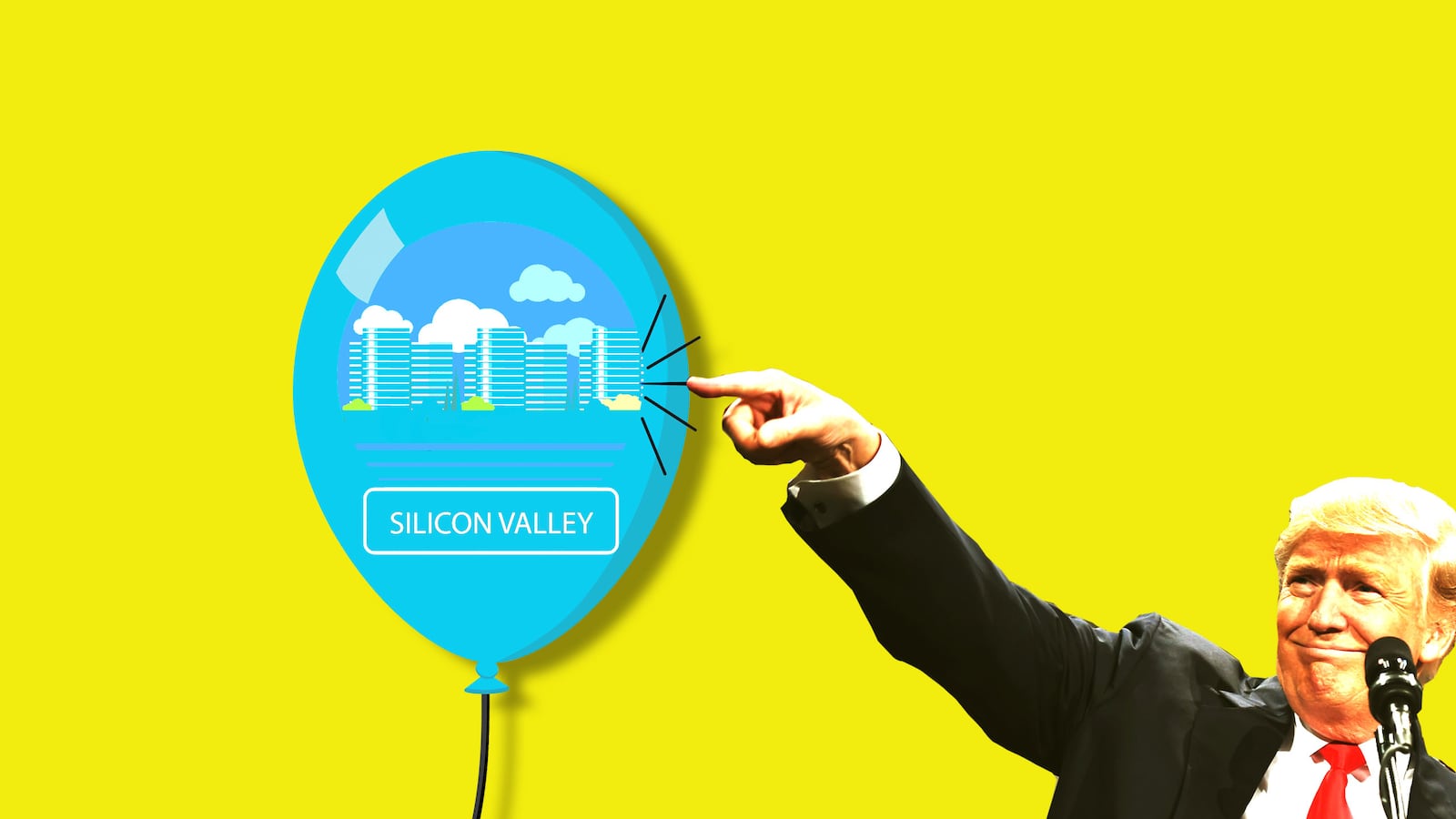“Steam seems to have killed all gratitude in the hearts of sailors.”—Jules Verne, Twenty Thousand Leagues Under the Sea.
A few months ago, the former CEO of a multi-billion-dollar tech company in Silicon Valley told a private gathering that it didn’t matter who was elected President of the United States. “The President doesn’t have much power,” he said, according to someone who was there.
This was a curious thing to say about the man (or woman) controlling America’s nuclear codes. Yet the notion that the U.S. President’s oomph is trifling doesn’t surprise me coming out of this part of the world. People here tend to consider government as a far less potent force in the world than technology.
This sentiment was underscored last year in an Arc Fusion survey that asked hundreds of tech leaders in northern California: “What will be more important in the next 100 years: politics or technology?” The result: 58 percent favored technology, versus 42 percent for politics. (Take the informal poll here).
This indicates more than just a faith in technology. It’s part of a potent ethos of optimism in locales like Silicon Valley, where people are super-charged to build things that will disrupt the world—and in many ways they have, whether it’s the impact of steam and electricity in an earlier era, or smart phones and the internet today.
As futurist and investor Juan Enriquez said: “Only societies that build the new have a chance. The rest will debate but will not have the power to decide and guide.” Enriquez told me he votes for “technology” over “politics.”
In places like San Francisco and Boston, the faith in technology and change has been coupled with a powerful sense that history is also on the side of social change like LGBTQ and gender rights, renewable energy, and protecting immigrants.
Yet one wonders how people in West Virginia—where Donald Trump garnered almost 70 percent of the 2016 presidential tally—would vote in the politics versus technology survey. Or in my home state of Kansas, where a mere 36 percent voted for Hillary Clinton. More interesting is how people in these states are feeling about optimism and the disruption thing.
Most polls and a slew of “what happened” stories—including the brilliant Hillbilly Elegy by J.D. Vance—are suggesting that people living outside the bubbles of places like Northern California are not jazzed about the future. In that other bubble, those inside heard candidate Trump’s message that the country is going to hell and it resonated, even if many didn’t much like or trust The Donald.
It’s hard to disentangle the layers of their discontent. It ranges from anger about immigrants and flagrant racism to a dislike of EPA regulations and a distrust of politicians and other elites. Many feel like they have been ignored, or lost something—good jobs, predictable social norms, influence over their own destiny.
Trump supporters do not seem to be overtly against technology— they like their gadgets, too. But many are having trouble with the upheavals brought on by the culture of relentless technological and social change being driven mostly by the coasts. Some also realize that the reason they now get paid less for selling knick-knacks at the mall than they did in a factory has as much to do with robots as illegal Guatemalans.
Now they have voted their discontent in numbers that have shocked the coastals (including me)—almost 63 million is the final tally (2.5 million less than Hilary, but still, 63 million!) This is an astonishing reprimand to Silicon Valley–style thinking, that a vast army of people voted for change that would reverse the historic tide that many of us assume is inevitable.
The question is whether this protest vote—and Brexit in the United Kingdom, and the repudiation of constitutional changes in Italy—is a temporary venting, the last gasp of a worldview whose time is passing, or a real uprising of the discontented.
Whatever it is, techno progressives should pay attention on the off chance that this is not an aberration, or that darker visions of the future run deeper than we thought, and will more difficult to overcome. This has happened before in history.
Consider Galileo, who was threatened with torture for not towing the Catholic line that the earth was at the center of the universe. Or Albert Einstein, who discovered how certain political leaders supported by mobs of unhappy people who had lost jobs and a sense of purpose can subvert technology for evil.
More recently, George W. Bush all but cancelled federal funding for embryonic stem cell research, setting back this promising research for years and forcing much of it offshore. He also unleashed a techno-war in Iraq in a political decision that destabilized an entire region.
On the positive side, government provided the initial funding and horsepower in the mid-20th century for the early stages of solid-state electronics and IT. Under Barack Obama the feds have supported and fostered tech development in renewable energy, electronic medical records, and artificial intelligence.
Other than a pronounced Twitter habit, we know very little about Trump’s vision for science and technology. But his rhetoric about restoring a mystical past before machines displaced humans in factories, and his zeal in promoting oil and coal does not suggest a techno-optimist-oriented administration.
Nor do his picks for interior secretary and the head of the Environmental Protection Agency. Both jobs went to traditionalists who back oil and coal, and are either climate-change skeptics or deniers.
The election did not go unheeded out here in the Valley. Trump’s election shocked most people. People don’t quite know what to say when his name comes up in tech meet-ups and tony SF coffee shops. Social activists glower, while tech folk look confused, in part because no one really knows what Trump will actually do for or against what Juan Enriquez calls “the new.”
The conversation, however, is already swinging back to familiar territory. After all, these are optimists, with some of them gulping and saying they will give Trump the benefit of the doubt. “Maybe he’ll be okay,” they say.
We’ll see, although I’m hoping that tech-futurists pay attention to bubbles beyond their own, and do something they have seldom done —which is to be vigilant in protecting their vision of the future. Even better would be an effort to reach out to the “Make America Great Again” crowd and take them and their underlying concerns seriously. Part of this is self-interest, since history is replete with examples where a failure to do so can lead to politics—or the body politic— interfering with or subverting technology and science, at least for a while.
Whatever happens, it’s likely that we’re about to experience a concrete test over the next four years to see if politics out-Trumps technology—or vice-versa.
David Ewing Duncan is an award-winning, best-selling author of eight books published in 21 languages. He is the Founder and Curator of Arc Programs.
Updated 12/12/16 to clarify that Galileo was threatened with torture.






